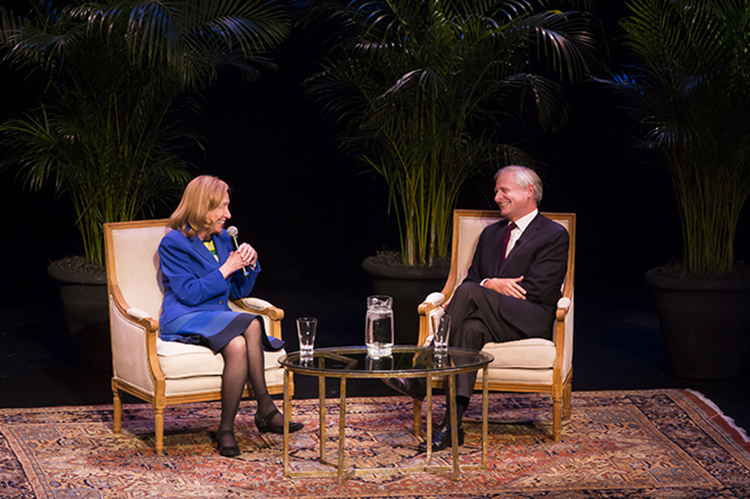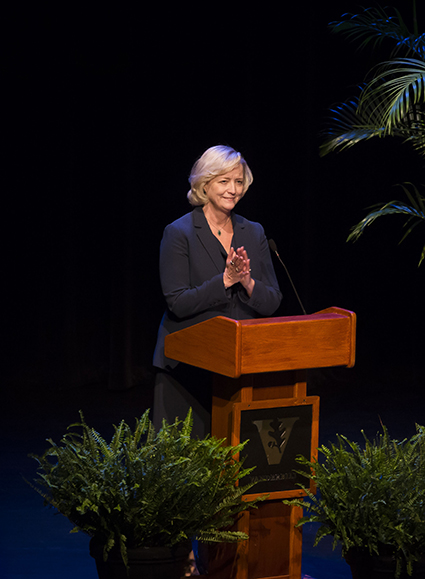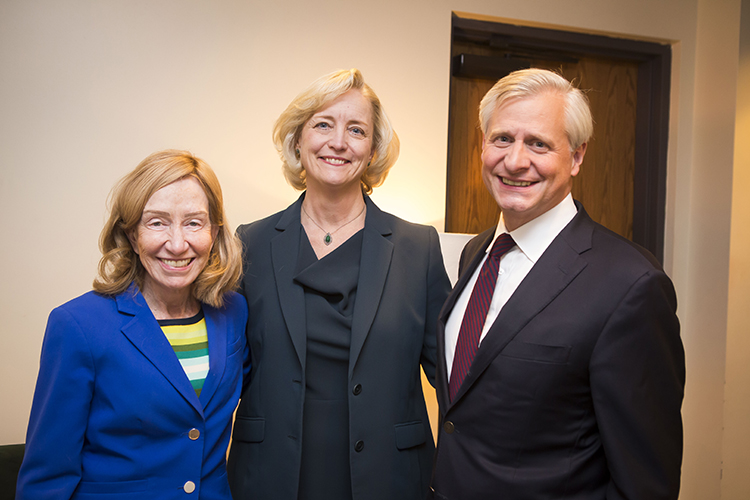
A leadership trait shared by many of America’s most admired presidents has been their courage to expand, challenge and even walk away from their base of supporters when necessary to uphold the nation’s founding principles. That was among several “Lessons of Presidential Leadership” discussed by Doris Kearns Goodwin and Jon Meacham during a Chancellor’s Lecture on Oct. 31.
Interim Chancellor and Provost Susan R. Wente introduced Goodwin and Meacham—both Pulitzer Prize-winning authors and historians—to the 600 students, faculty, staff and community members who filled every seat at the Blair School of Music’s Ingram Hall. Wente noted that the program provided an opportunity to explore the fall lecture series’ theme—”Culture of Respect; Culture of Caring”—through a historical lens.

“Goodwin uses our country’s history as a way to inspire change, activism and compassion among her present-day readers, and that connects closely to our lecture series theme,” Wente said. “The theme also speaks to our open-minded approach to learning from our history—as a university, as individuals and as citizens.”
Goodwin, a recipient of Vanderbilt’s prestigious Nichols-Chancellor’s Medal and the 2009 Senior Day speaker, has written extensively on American presidents. Her most recent book, Leadership: In Turbulent Times, draws upon her research of the four presidents she has studied most closely—Abraham Lincoln, Theodore Roosevelt, Franklin D. Roosevelt and Lyndon B. Johnson.
Meacham, Distinguished Visiting Professor in the Vanderbilt Department of Political Science, is a presidential biographer and author of The Soul of America: The Battle for Our Better Angels, which looks back at critical times in American history when hope overcame division and fear. Meacham holds the Carolyn T. and Robert M. Rogers Chair in American Presidency.
Meacham opened the conversation by asking Goodwin to reflect on how the presidency has changed over the past half-century since the presidency of Lyndon B. Johnson, for whom she began working as a White House Fellow and later assisted in the writing of his memoirs. Goodwin responded that 50 years ago, American presidents and members of Congress were able to work “across the aisle” to produce major legislation. She gave the examples of Medicare, Medicaid, federal aid to education, immigration reform and more being accomplished during Johnson’s presidency.
“What was different back then was that political office-holders felt a sense of loyalty to their institution and to the country, putting that above their own partisan divides,” Goodwin said. “Also, the majority of the lawmakers were military veterans who had gone to war, so they knew what it was to have a common cause that went beyond sectional, regional lines.”
A disturbing trend today, Goodwin said, is the increasing importance that citizens place on their political parties for self-identification. “Somehow, the political party has become a source of identity, a source of silos and a source of difficulty in our highly charged political environment,” she said. “As a result, we bounce from one president who is looked upon badly by one party to another who is viewed negatively by the other.”
Goodwin also talked about how the context of a particular time in history has impacted the leadership strengths used by American presidents. Goodwin gave the example of John F. Kennedy, who was highly informed on foreign policy at a time when this was the nation’s focus. “The Cuban missile crisis was the most memorable moment of Kennedy’s presidency,” Goodwin said. “On the other hand, he was not able to get Congress to move quickly on his domestic programs, and certainly not on civil rights.” She noted that, in contrast, Johnson was a master strategist when it came to dealing with those serving in Congress.

Goodwin emphasized the important role of social movements during the leadership of some of the country’s most beloved presidents. “When Abraham Lincoln was called the ‘liberator’ for signing the Emancipation Proclamation, he pushed back,” Goodwin said. “Lincoln credited the anti-slavery movement for this achievement. And it was true. Without the anti-slavery movement, there would not have been a Republican Party or a Lincoln presidency.” She also cited the ’60s civil rights movement as helping Johnson pass the Voting Rights Act and other signature initiatives related to desegregation.
Meacham concluded the program by asking Goodwin whether she remains an optimist about the nation’s future despite the current divisiveness and rancor between the political parties. “History does suggest there is something very special about this democracy,” she said. “When citizens have been confronted with the gap between reality and their ideals, they have responded. We’ll come through this.”
During Goodwin’s visit to the university, she also engaged with undergraduate students in a political science course called “Leadership,” co-taught by John Geer, the Ginny and Conner Searcy Dean of the College of Arts and Science and a professor of political science; former Tennessee Gov. Bill Haslam, Distinguished Visiting Professor of Political Science; and Meacham.
The Chancellor’s Lecture Series strives to connect the university and the Nashville community with leaders and visionaries who are shaping our world. For more information about the series, visit the Chancellor’s Lecture Series website, email cls@vanderbilt.edu or follow @VU_Chancellor on Twitter and Instagram.